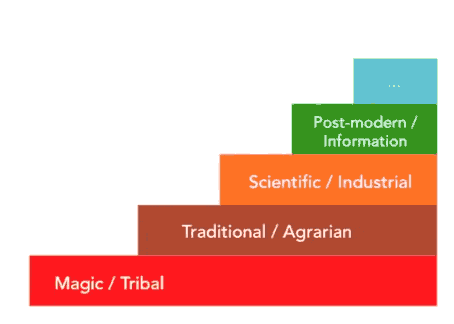There’s something broken in how we run organizations today. Polls about happiness at work show that 60-75% of people are disengaged. Many professionals are tired of the rat race, tedious budget circles, office politics, cubicles, being controlled and feeling limited. They wonder: how’s what I’m doing serving a better world? Or: how’s my job helping me develop my unique talents? Well, at least it pays the rent… but I’m so tired/stressed/bored… (fill in the blanks). Isn’t it time for Organizational Evolution?
That’s why I left lifetime employment with golden handcuffs (wonderful salary and perks) seventeen years ago. I left a steady 40 hours a week to start working 60-80 hours with no guaranteed outcomes whatsoever. At the start, I sometimes lay awake at night, worrying about money – but I was never bored again – and I enjoyed everything I learned during my fascinating journey. I extended my development, creativity, autonomy, purpose, freedom – even though I always worked my *** off and it wasn’t always a walk in the park. But I was alive and in charge! I was not just making a living, but making a difference.
My work life bloomed when I left my job and bosses and became an entrepreneur. Entrepreneurship has taught me so much (I’ll tell you more some other time) that I couldn’t have learned in my former job. It brought me (more) self-management, wholeness, and evolutionary purpose.
Self-management, Wholeness, and Purpose
And that is what most organizations cannot offer their employees. Because they are stuck in an old-fashioned mindset with the associated structures, processes, cultures, and outcomes. Everyone seems stuck. Not just the shop floor employees doing routine tasks bending under the rule of top-down micro-managers. The managers themselves are exhausted as well.
Self-management, wholeness, and evolutionary purpose are what “new organizations” offer their employees – it’s a whole new way of organizing and collaborating that is emerging around the globe. The mainstream organizations are still those well-known decors of Dilbert-like situations. But “new organizations” are doing it differently. And they aren’t just start-ups of hopeful hippies. They are impressive organizations who have been around for a while – but many of them went unnoticed until now.
Stages from Wolf Packs to Families
 Their new way matches with the stages of human development. You remember history class? Or maybe it was during anthropology, philosophy or sociology lectures – or on National Geographic Channel.
Their new way matches with the stages of human development. You remember history class? Or maybe it was during anthropology, philosophy or sociology lectures – or on National Geographic Channel.
We started out in the tribal phase with magic thinking and hunters/gatherers. Then we had the Agrarian Revolution that taught us how to plan for crops to harvest and structure our communities in hierarchies and schedule our time. The scientific revolution in the Renaissance enticed us to think for ourselves and innovate, to achieve goals and do our best to get ahead in life – using our brains instead of authority and social class. It brought us the Industrial Revolution and the next technology push, the Industrial Age – until we started to wear the earth and ourselves out – by pushing too far an too hard for shareholder value, material wealth, profits, success and status. Welcome to the Post-Modern Information Age where people long for a more human touch again, value-driven cultures, kindness, empowerment, stakeholder value, positive leadership…
Reinventing Organizations
This fascinating perspective is painted by Frederic Laloux, a management consultant who quit consulting to research which organizations would energize him (instead of exhaust and disengage). He connects the dots and paints the bigger picture in his book: Reinventing Organizations. We’re approaching our fifth big paradigm change. We and our organizations are already evolving toward the new era…. Self-management, wholeness, and evolutionary purpose seem to be the three key breakthroughs that “new organizations” offer – according to Frederic Laloux.
The organizational stages during human development resembled wolf packs (tribal phase), armies (agrarian phase), machines (industrial age), and families (post-modern information age).What’s next? We’re on the brink of the fifth major leap in human development. Will we evolve to the Authentic Age, or the Integral Age? We long to self-manage, to be WHO we are at work (not just the narrow rational, masculine, professional ego side of ourselves) and to find an evolutionary purpose (why are we here, contributing to this organization’s purpose that makes a difference in the world?).
I personally found these benefits as an entrepreneur and self-employed consultant. Managing myself, being my whole self on my terms (instead of wearing a narrow professional mask and playing by someone else’s rules and standards) and finding my purpose to make a difference, absolutely energized me. But in the near future, I could find these advantages by joining a “new organization”…. Are you ready to jump in?
Do you like this post? Please help me spread positivity by tweeting, sharing, and liking.
Marcella Bremer co-founded this blog and ocai-online.com. She’s an author and culture & change consultant.
One Response
Yes, we are headed for a change in our conception of human nature and organizations but it will not come easily. I have found an ecological mental model enormously helpful – looking at organizations as ecosystems. From an ecological perspective enterprises are conceived in passion, born in communities of trust, grow through the application of reason and mature in power. Power freezes organizations, making them insensitive to what is happening outside, which sets them up for crisis and destruction but with the possibility of renewal.
For an essay that gives context to this change see http://www.themontrealreview.com/2009/Post-Rational-Management.php